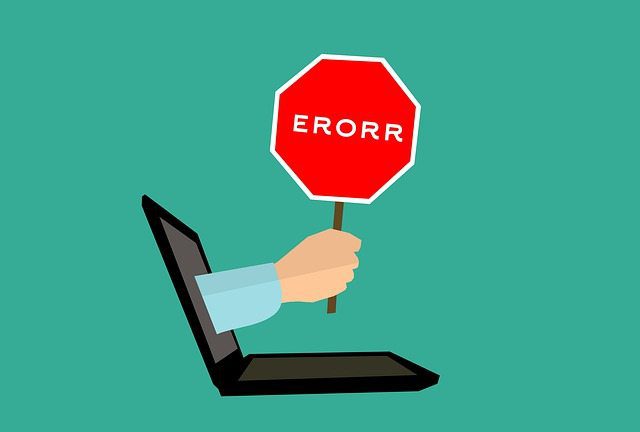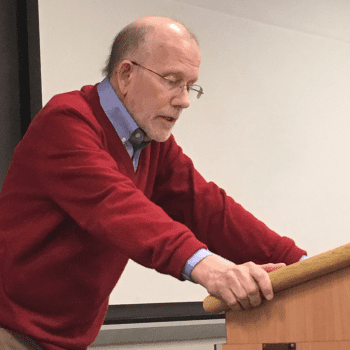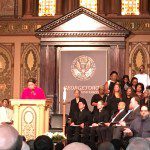What is a Christian? What is an intellectual?
I guess my first observation is that people who do not think there are many Christians probably won’t find as many Christian intellectuals. That’s just math. I’m thinking here of people who tend to use “Christianity” as a synonym for conservative evangelicalism in the United States. If you call mainline Protestants heretics to their faces and silently think Catholics are heretics even if it’s now impolitic for you to say so, then you have just eliminated a big chunk of the universe of people who might be Christian intellectuals.
I bet it really does seem like there are no Christian intellectuals if you don’t think, say, Charles Taylor is much of a Christian.
— Jacob Lupfer (@jlupf) August 17, 2016
Anyway, who is an intellectual? I used to consider the words scholar and intellectual to be basically interchangeable. But now I think that is a mistake. A scholar is someone who makes discoveries and adds to the sum of human knowledge, usually through publishing their research in scholarly journals or university presses. It seems reasonable to me that fewer scholars today think of themselves as Christians than in ages past. Even scholars who happen to be Christian may not think of themselves as “Christian scholars.” And, significantly, there are surely plenty of people who think of themselves as “Christian scholars” who are not really scholars in any meaningful sense.
Discussions about Christian intellectuals usually assume that people who attain this status must have a significant public reach. A lot of people in postwar America could tell you who Reinhold Niebuhr was. Today, a lot of people could not name an academic theologian or even a Christian intellectual. Jacobs, I sense, wants to argue that the category largely ceased to exist because the people who could legitimately claim the label simply stopped. He wants to talk about the reasons why, and push back a bit against the evangelical presumption that believing Christians were shunned and shamed out of public life.
Categories of Christian intellectuals
It turns out that “Christian intellectual” means different things to different people. There are a lot of factors we can objectively quantify: church membership, number of peer-reviewed articles published, number of books authored, number of TV appearances, number of Twitter followers, and so on. I would argue there are factors we can assess and measure, even if we cannot do so objectively. These would include: quality of personal devotion, prestige of academic publication record, importance of scholarly contributions, rigor and creativity of thought, appeal to audiences outside one’s own tradition, and others.
On one level, we can find the Niebuhr of our time just by figuring out who the most famous Christians are. Rev. Billy Graham may not be a a scholar, but he is a hugely significant figure by any measure, everyone knows who he is and he met with 12 U.S. presidents. So maybe he is the great Christian intellectual of our time.
We could look to the universe of public intellectuals and identify the one or handful who seem to display the most authentic Christian commitments. Of course, this depends on what you mean by “public intellectual” — and if there is even such a thing. But you could come up with metrics to assess reach, influence, and engagement. Then pick out the top Christians.
Conversely, we could look at the universe of Christians (and a lot of people seem to enjoy deciding who is in and who is out), then simply identify the ones who have the greatest reach.
But you quickly run into the likelihood that this is not a quantitative matter. There’s some intangible “it” factor that some public Christians have and some do not. It may have to do with personality, intelligence, reputation, prestige of affiliations, physical appearance, style, or any number of other things. We can’t quite put our finger on it, but we know it when we see it.
Then there is the fact that there are probably several paths or skill sets that can lead to “Christian intellectual” status. I have usually assumed there has to be some significant standing in the academic community. But maybe not. Maybe writers and journalists have a better shot. They can reach a larger public than most academics, even if their ideas and observations are not as robust or rigorously/empirically verified. C.S. Lewis was an academic (though in a more British, generalist, and 0ld-fashioned sense than we think about today). G.K. Chesterton was a journalist. Both were major Christian public intellectuals, even if their standing rested on different professions and competencies.
It could be that today’s Christian intellectuals has eclipsed the traditional categories. In a culture that values entrepreneurship, obsesses over image, and worships fame, maybe the mantle of “Christian intellectual” is conferred on self-promoters who are attractive, dress fashionably, have famous friends, and/or self-promote on the speaker circuit and the Christian conference industrial complex.
Variations among ‘Christian intellectuals’
I am very pleased to have a reputation (at least among 6 or 7 of you) as someone who can comment fairly and insightfully about various traditions within American Christianity. Here are some quick observations about some distinctions I perceive among mainline Protestants, Catholics, and evangelicals on the subject of Christian intellectuals.
Mainline Protestants. This group probably places more emphasis on institutional prestige than the others. Significantly, most of the leading mainline seminaries are affiliated with research universities, thus giving some heft to faculty and graduates of such institutions. Mainliners also fit into mainstream institutions more easily than evangelicals do. For instance, Mainline professors in religious-studies disciplines usually feel at home in secular professional organizations like the American Academy of Religion/Society of Biblical Literature. Mainline writers, I think, are much likelier to publish books with nonsectarian presses. Mainliners are no longer the dominant culture, but they do not have nearly as prominent a subculture as evangelicals have.
Roman Catholics. Obviously, Catholics have the longest tradition of integrating faith and reason. They have more people over more centuries who have devoted their lives to articulating, praying, defending, and propagating the Christian faith. This group probably has the broadest diversity of ideologies. It certainly has the most definitive sense of attachment/belonging. Whereas a lapsed mainline Protestant is basically a “none,” a lapsed Catholic is likelier to consider himself or herself a Catholic. So Catholics draw from a broad array of people, but there is a lot of infighting and the question of who is right or who is a “good” Catholic is hotly contested. (I find this kind of interesting given that the Catholic Church has by far the longest, most comprehensive, and most precise catechism. More to disagree about, it turns out…) Catholics also have a somewhat easier time fitting in with mainstream/secular/nonsectarian institutions. But the “Catholic” label carries some burdens and challenges the others do not, especially for writers and politicians.
Evangelical Protestants. Though there are significant differences between progressive and conservative evangelicals, this group has the clearest ideas about who’s in and who’s out. They are skeptical of mainstream institutions (though the skepticism here is mutual). But I find that evangelicalism has such a thorough network of parallel institutions, it seems difficult to excel, thrive, and receive recognition in evangelical *and* mainstream institutions. This seems especially true in evangelical academia. Scholarly output tends not to matter as much: If you get good teaching evaluations and remain in good standing with a local church, you can be a great evangelical scholar without ever contributing meaningfully to an academic discipline. To be a star in evangelical academia, it’s better to write online articles for popular websites, have 10,000 Twitter followers, and write a non-academic book every few years than to win an award from a learned society or publish an article in your field’s flagship journal. And so I see a real dilemma here about what evangelicals value. Do they want to reach a broad public? Or reach their own people in meaningful ways? My basis for knowledge and opinion about this comes through the fact that I went to an evangelical college and have studied evangelical institutional life. I used to look down at evangelical professors. At my college, hardly anyone had a publication record that would get them tenure at a R1 university. But they were such caring teachers and mentors. They knew and loved their disciplines even if they were not making discoveries or contributing to the discipline’s body of knowledge. They were intellectuals in a true and authentic sense, even though few of them were scholars.
What has Athens to do with Jerusalem?
This quotation from the early Christian writer Tertullian stands the test of time not because we remember its original context perfectly, but because we find that it perfectly encapsulates our biggest questions about politics and religion, reason and faith.

I think the term “Christian intellectual” is a kind of mirror. I haven’t named any names, but if I told you my ideal Christian intellectuals, it would say a great deal about me (and perhaps hardly anything about them). The mirror metaphor also resonates because I have sensed that the people who talk about this subject the most are people who most want others to apply the label “Christian intellectual” to them.
One great thing about Christianity is that it can be as intellectual as you want it to be. But it doesn’t have to be very intellectual at all. Few people have the luxury to speculate, debate, or wax eloquent about this arbitrary, manmade category of “Christian intellectual.” Those who do operate from a place of great privilege.
Jesus said, “Thou shalt love the Lord thy God with all thy heart, and with all thy soul, and with all thy mind” (Matthew 22:37). The mind part matters. But you don’t have to be influential or educated or prolific or even smart to matter for the kingdom God sent him to proclaim. You certainly don’t have to be a Christian intellectual to love thy neighbor as thyself.
So I’m not sure how much this really matters.
Now, please excuse me while I read and think about Alan Jacobs’ essay.
[NOTE: This blog is mostly about the role of religion in the 2016 election. But I’m starting to think about how I will use the blog after November, and I’m beginning to write about some of my other hobbyhorses, including religious freedom. Thanks for reading my post. My best wishes to you all. -j-]












